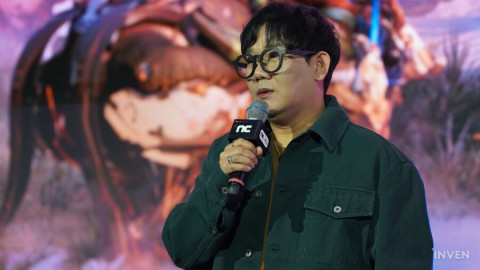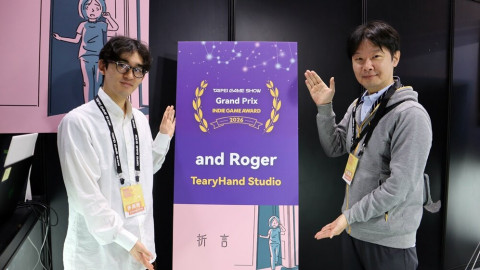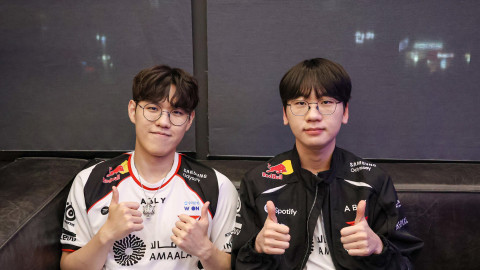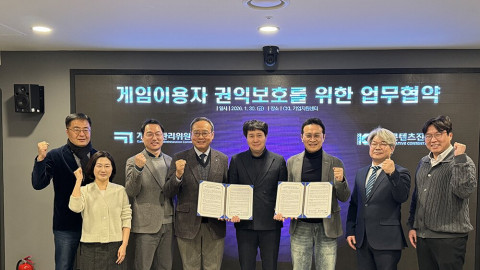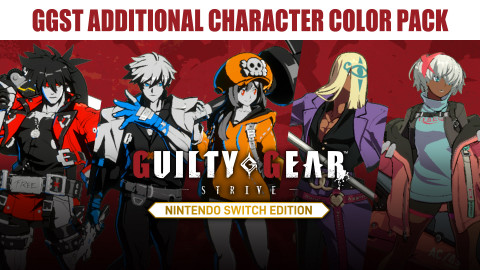
"What does it take to develop and launch a successful game?"
While there are several factors, at its core, it boils down to "a high-quality game, optimized target user and market, and securing ample capital with a reputable publisher." Merely creating a good game or having abundant funds does not guarantee success. It's the harmonious convergence of all these elements that paves the way for a game's triumph.
To achieve success in gaming, one must secure the necessary funds for development, gather user feedback through testing during the development phase, and have the support of a publisher to ensure a successful launch in the target market.
In relation to these aspects, GXC has been actively supporting game developers in various ways, fostering ecosystem development. Through programs like 'G.Round,' which involves testing games with approximately 410,000 users worldwide, 'Global Top Round (GTR),' offering offline events and 1:1 online consultations for investments, localization, and operations required for game launches, and ‘Round Ventures,’ an investment-specialized company to be established in 1Q 2024, GXC assists startups that have the ability to develop but those who face challenges in funding, operations, localization, and publishers.
One of GTR's startup support programs, the 'GTR Conference,' held annually, took place from November 28th to 30th this year in Malta. Starting in Hawaii in 2015, this marked the 9th edition of the GTR Conference, having been hosted in various locations such as Cologne, Melbourne, Busan, Singapore, and Sweden.
At the GTR Conference, introductions were made regarding G.Round and the GTR Accelerator program. Additionally, 20 selected startup developers and publisher representatives gathered for pitching sessions and to choose the final developers for participation in the investment and accelerator programs. Furthermore, spaces were arranged for attendees to play games currently in development by each selected studio.
GTR: All-Encompassing Process for Successful Global Launch
GTR serves as a support hub for game startups, providing assistance from development to publishing, fund acquisition, and ensuring sustained growth. It emphasizes delivering a systematic environment to help startups achieve key milestones quickly. GTR operates its own investment and accelerator programs and organizes the GTR Conference annually to select participating companies.
Pontus Mahler, Chief Strategy Officer, started his session by expressing that he wants to help small game development studios understand business operations, contract negotiation methods, how to find publishers, and how to find investors to expand their scale.

GTR conducted a total of 64 investments across 32 countries. The program for developers includes 6-8 workshops, conferences, and support for 7-12 studios through investments and accelerator programs each year.
GTR's core values, totaling eight, encompass investment execution, mentoring services, company strategy formulation and documentation, business development, game feedback through G.Round, a family-like approach, fund acquisition and M&A, and legal advisory services.
Focusing on startups at the angel, pre-seed, and seed stages with tech demos or playable builds, GTR offers investments. It connects internal and external mentors to provide coaching and solutions for business growth, from founder coaching to formulating company strategies and long-term plans. GTR also helps create necessary documents for startups in pitching or investor relations and leads negotiations with venture capital, publishers or licensing partners.
Moreover, GXC's in-house game testing platform, G.Round, aids in receiving honest feedback from gamers worldwide during development. This process provides valuable insights to enhance game quality and attract publishing and investment opportunities. It also offers costly services like fund acquisition, M&A, and legal advisory to support sustainable growth for development studios.

First, game development companies must apply for participation online. Originally, there was a separate application period of 1 to 3 months within the year. However, to actively seek out more quality studios, they currently receive applications on a rolling basis, eliminating the designated timeframe. In addition, the GTR team travels to gaming events worldwide to discover visionary development companies, inviting them to the conference.
The approximately 20 selected development companies go to the GTR conference, engaging in networking with publishers, investors, and partners, sharing various information, and conducting pitches to be selected for the accelerator program. The final Top development companies chosen here decide whether to proceed with investment or the accelerator program.
The GTR Accelerator Program provides feedback on various aspects that indie development companies require, such as game development, funding, localization, and securing global publishers. GTR mentors and experts offer coaching and solutions for game development, release, live operations management, plan global launch strategies, and provide legal advice during the contractual stages. To facilitate this, they have established close collaborations with around 56 investment firms.
Approximately 6-80% of the development companies contracting with GTR have attracted follow-up investments through GTR network-affiliated angel investors. Through collaboration among seeds, series A/B/C stages investments, renowned game funders who seek acquisition, and venture capitals, GTR aims to facilitate more development companies to receive investments.
The essence of the GTR Accelerator Program lies not only in providing short-term money or solutions but in offering continuous support, helping development companies to complete game development successfully and launch it into the market.
G.Round: Feedback from 410,000 Gamers Worldwide

G.Round serves as a platform for obtaining user feedback during game development. Boasting 410,000 gamers from 190 countries, it has tested a total of 363 games in collaboration with developers from 30 countries.
Every week, two new games are uploaded to the platform for a 4-week playtest period. During this time, users play the games freely, submit feedback, and based on the analysis, result reports are provided to the game developers.
Currently, around 16,500 Discord members actively participate, with an average of 1,400 users playing each game and accumulating approximately 500 reviews and 250 survey responses. The average age of participating gamers is about 23, with 89% playing more than 5 hours a day.

James Choi, Chief Business Officer, explained that many users active on G.Round are hardcore gamers who enjoy games of various genres. Since they play for a long time rather than just trying it briefly, G.Round can receive in-depth and professional user data.
For private tests starting in June this year, G.Round selected around 1,000 highly active users from its existing user base as testers. Developers receive real-time dashboards, more precise analysis results than public tests, recorded gameplay videos, and the option to contact users leaving interesting reviews for additional interviews.

The users who play games and participate in reviews and surveys earn G-Points. With these points, they can purchase games on the G.Round platform and even buy gaming gear like mice or headsets. For private tests, cash is given as a reward.
There are about 2 million game companies worldwide, and successful ones generate annual revenues ranging from $10 million to $1 billion. However, only 5% of these companies achieve this level of success, as it requires production costs between $5 million and $200 million. Therefore, James Choi mentioned that G.Round supports game companies in the growth process by alleviating the cost burden needed to develop and launch games successfully.

To enhance the quality of data provided to game development companies, G.Round is introducing AI technology to its platform. He explained that the collected data is analyzed and summarized through AI. It helps filter out fake reviews by analyzing the facial expressions and emotions of testers in video reviews. Furthermore, they plan to introduce features that predict revenue, providing game companies with reliable data.
Additionally, G.Round can use an AI-based game database algorithm to analyze gameplay data, user activity-related metrics, actual sales data, etc. This allows them to calculate expected sales by region and use it as a foundation for verifying game quality, which is crucial for determining the investment decisions of Round Ventures and other joint investors.
Currently, G.Round collaborates with governments such as Sweden, Switzerland, Malta, Singapore, Malaysia, localization service companies, game venture capitals, etc., issuing tester vouchers. In the future, they expressed their ambition to collaborate with partners in various countries to provide more tester vouchers to game developers.
2bytes: Co-Publishing, Sharing the Risk

In November, G.Round entered into a strategic partnership with 2bytes. At the GTR conference, 2bytes provided details about the strategic partnership. 2bytes, established in 2020, serves as a global expansion partner for game development companies, supporting all aspects needed to release games in specific regions, including translation, QA, and customer service. Over the past three years, they have partnered with around 120 development studios and publishers, handling localization tasks for various titles like Black Desert, Lies of P, Odin, etc.
Currently, they can translate Korean into 60 languages and ten languages into English. Leveraging their experience of working with 60 million words over the past three years, they have developed an AI-based localization engine called 'BoraCAT' to reduce costs and increase efficiency in the co-publishing model. BoraCAT is about 60% complete, and test results have shown noticeably natural translation results compared to other tools.

Apart from localization, 2bytes manages a Discord community with 260,000 members, social media video production, QA for all platform titles, and a seven-language user response system through their Indonesian branch. 2bytes plans to expand its game service outsourcing business, targeting the global market.
2bytes stated, "Inbound sales outperform outbound sales threefold, with 75% of our business being inbound sales. This means that regular customers recommend our services to their acquaintances."
Having built a network based on years of localization and service business, 2bytes is set to launch its co-publishing business next year officially. The plan is to onboard games to be tested by G.Round and, through venture capital funds like GTR or Round Ventures, invest in games that receive positive feedback, releasing and servicing them through 2bytes.

They emphasize a vision of co-publishing, where they share risks with developers, aiming to grow together. 2bytes will publish games verified for gameplay by G.Round, combining them with their services to support global developers and partners with higher revenue distribution.
"Spending a lot of budget does not guarantee good publishing. A good publisher is as conscientious as the developer, trustworthy, and able to respond quickly in crisis situations. Recently, Korea has moved away from focusing solely on MMORPGs, with games of various genres ranking high. I think this is a good opportunity for developers worldwide to test the East Asian market through Korea."
Pitching: 20 Developers and 7 Publishers

At the GTR conference, 20 game developers were given 7 minutes each for pitching, introducing their companies, ongoing games, and presenting budgets for development and marketing. Developers from around the world, including the UK, France, Germany, Australia, Malta, etc., showcased various game genres, from roguelikes to animation-based RPGs, action-adventures, and open-world survival-craft titles.
Most developers’ pitching focused on developing games for PC and consoles, seeking publishers and support in localization, QA, and PR. Toward the end of their presentations, each developer specified the budget amount needed based on the size of their company, ranging from hundreds of thousands to millions USD.
Goosebyte Games, developing the open-world survival-craft game 'Signal,' introduced UGC-based elements in the game. They highlighted how the gamer's actions in developing space and installing structures cause the planet to change and react.
Bonsai Collective, the UK-based developer of 'Luna Abyss,' an upcoming first-person action-adventure game where players become prisoners exploring giant structures beneath the surface of a moon, presented its gore-filled and uniquely charming graphic style. Luna Abyss is expected to be released in the US, Europe, as well as in Korea, Japan, and China, with subtitles.
Blackbox Studio, working on an open-world game in the animation RPG gacha genre, presented their philosophy of creating games for the community. They emphasized their Discord channel, boasting 400,000 members, and a total of 1.7 million followers on all social media combined.

Samuel Goddard, founder and developer at Blackbox Studio, originally fond of animation, previously created a fan game for Attack on Titan. His TikTok video garnered 70,000 views, and subsequent videos reached millions, even hitting 14 million views. Using these platforms, he brought together a large community through Instagram, YouTube, and Discord.
Blackbox Studio was selected as a Top 10 developer at last year's GTR conference, and earlier this year, they signed a contract with GTR, receiving an initial investment of $40,000. Samuel expressed his appreciation, stating, "Through the GTR conference, I could receive various feedback and have opportunities to meet with publishers. Thanks to this, I even had a meeting with a publisher at this year's Gamescom, which might not have happened if I had personally inquired."

Furthermore, at this year's GTR conference, representatives from seven publishers, including Shiro Games, Team17, PlaySide, Playstack, etc., introduced their respective companies and shared their thoughts on the games and developers they pursue as publishers. Among these publishers were those emphasizing close collaboration through small teams, publishers with a staff of 100 who value people, and those concentrating on enthusiastic gamers and AAA games.
Despite differences in the size and genre preferences for the games they seek, honest and transparent communication and the formation of close and friendly relationships with developers were unanimously considered crucial factors by the publishers. Team17 highlighted the importance of "working with fantastic people to create games" as their most important factor, while Shiro Games stated, "We, too, as a business, value metrics like expected revenue. However, honest communication with developers as a publisher is crucial."

They also emphasized their respect for developers, stating that they provide advice when needed but do not interfere with creative factors related to game development. Publishers clarified that they do not own the rights to intellectual property, and IP remains with the developers. Some publishers even expressed a willingness to share financial risks.
In conclusion, publishers attending the GTR conference stressed the importance of searching for suitable publishers, comparing it to finding a soulmate. They advised developers to constantly ask questions, negotiate, and communicate because finding the right publisher is a significant part of the success of a game.
“Finding a publisher is finding someone to have a very long-term partnership with. That being said, finding a good publisher is like finding a soulmate. Finding a suitable publisher is crucial for the game's success, so constantly ask questions, talk, and communicate.”

Sort by:
Comments :0




